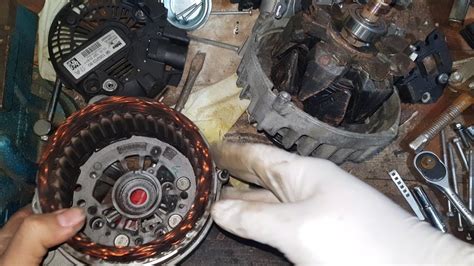Essential Guide to Alternator Bearings: The Key to Electrical System Performance
Alternator bearings play a crucial role in ensuring the proper functioning of your vehicle's electrical system. These components are responsible for supporting the alternator's rotor, reducing friction, and allowing it to rotate smoothly.
Why Alternator Bearings Matter
-
Smooth Operation: Bearings reduce friction between the rotor and stator, allowing the alternator to generate electricity efficiently.
-
Extended Lifespan: Proper lubrication and maintenance of bearings can significantly extend the life of your alternator.
-
Reliable Power Supply: Well-functioning bearings ensure a consistent power supply to critical electrical components, such as the battery, ignition system, and lights.
-
Reduced Noise and Vibration: Worn or damaged bearings can cause excessive noise and vibration, which can be distracting and interfere with driving.
Types of Alternator Bearings
There are two main types of alternator bearings:
| Type |
Characteristics |
| Ball Bearings |
Commonly used in smaller alternators; consist of inner and outer races with ball bearings rolling between them |
| Tapered Roller Bearings |
Designed to handle heavier loads; feature tapered rollers between a cone and a cup-shaped race |
Symptoms of Alternator Bearing Failure
Several signs may indicate that your alternator bearings are failing:

-
Whining or Squealing Noises: These noises are often caused by insufficient lubrication or worn bearings.
-
Dimming or Flickering Lights: Reduced power output due to bearing failure can affect the voltage supplied to lights.
-
Battery Discharge: Worn bearings can increase the load on the alternator, leading to battery drain.
-
Overheating: Excessive friction from worn or damaged bearings can generate heat, causing the alternator to overheat.
Diagnosis and Replacement
Diagnosing alternator bearing failure typically involves a visual inspection and listening for unusual noises. Replacement of bearings requires specialized tools and knowledge and should be performed by a qualified mechanic.

Effective Strategies for Extending Alternator Bearing Life
-
Regular Maintenance: Follow the manufacturer's recommended maintenance schedule for lubrication and inspections.
-
Proper Lubrication: Use the correct type of lubricant and apply it as recommended.
-
Avoid Overloading: Avoid placing excessive loads on the alternator, such as running multiple high-power accessories simultaneously.
-
Install a Heavy-Duty Alternator: If your vehicle experiences frequent or heavy electrical loads, consider installing a heavy-duty alternator with more robust bearings.
Humorous Stories and Learnings
-
The Tale of the Squealing Alternator: A driver ignored the warning noises from their alternator bearings for weeks, resulting in a dramatic squealing concert that attracted attention wherever they drove.
-
The Alternator That Ate Bearings: A mechanic was baffled when an alternator repeatedly failed despite replacing bearings multiple times. It turned out that the cause was a misaligned pulley that was putting excessive stress on the bearings.
-
The Battery Saver: A driver discovered that after replacing their alternator bearings, their battery no longer drained overnight. They realized the worn bearings had been causing unnecessary power loss.
Common Mistakes to Avoid
-
Ignoring Warning Signs: Neglecting to address unusual noises or other symptoms of bearing failure can lead to costly repairs.
-
Using Incorrect Lubricants: Applying the wrong type or amount of lubricant can worsen bearing wear.
-
Overtightening: When replacing bearings, it's crucial to avoid overtightening the bolts, as this can damage the bearings.
-
Mixing Bearing Types: Do not attempt to mix different types of bearings in the same alternator.
FAQs
Q: How long do alternator bearings typically last?
A: With proper maintenance, alternator bearings can last up to 100,000 miles or more.
Q: Can I replace alternator bearings myself?
A: While possible, alternator bearing replacement requires specialized tools and knowledge. It's recommended to leave this job to a qualified mechanic.
Q: How can I tell if my alternator bearings are overloaded?
A: If your alternator is frequently running hot or producing unusual noises, it may be overloaded. Consider upgrading to a heavy-duty alternator.
Q: What are the signs of a failing ball bearing?
A: Ball bearing failure often manifests as squealing or chattering noises.
Q: Can I use grease instead of oil to lubricate alternator bearings?
A: No, grease should not be used on alternator bearings. Use the recommended oil type and viscosity.
Q: How often should I lubricate alternator bearings?
A: Lubrication frequency depends on the manufacturer's recommendations and driving conditions. Consult your vehicle's owner's manual for specific guidelines.
